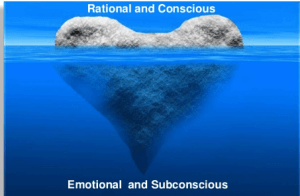I love watching what people, and Customers do. We human’s think we are so clever and sophisticated and yet much of what we do is totally irrational. When I am reviewing an organization’s experience I am on the look out for this type of irrational behavior as this will give me many clues on how to make it much better.
What do I mean by irrational behavior? Well, here are 7 things that are irrational. If you have ever done these then I am sorry to say you need to join our club or irrational people. Have you ever done the following?
- Pushed a button on an elevator several times when you really know it won’t make the elevator come any faster?
- Have you ever clicked your mouse or trackpad several times when your computer hangs up even though you know it won’t make the hourglass or color wheel go away any faster and might make the situation worse?
- Have you ever tried to fix an appliance by striking it with the side of your fist, like the character Fonzie in Happy Days?
- Have you ever abandoned an online chat because it was taking too long so you could sit on hold for five minutes or more with a call center.
- Have you ever gone to a store because it had many options, but then left without buying anything because you couldn’t choose between all the options that were available?
- Have you ever yelled at an inanimate object because it was frustrating you?
- Have you ever got three quotes for a service and thought. I don’t want the most expensive, I don’t want the cheapest, I’ll go for the one in the middle….
I can’t speak for you, but I have done all these things.
Observing human behavior is much more fascinating, endearing, and even alarming. What it isn’t is rational, at least not all the time.
Ze Frank has this to say about being human.
I am sure that you raised your hand a few times during this presentation. I know I did. Your Customers would raise their hands during this TED talk also. Much of what Frank is talking about are feelings and the irrational things we do as a result of them.
If We Know This, Why Do We Ignore it?
Humans are irrational. We do things that make absolutely no sense even when we know they aren’t going to work. Our feelings in these moments drive our actions and overrule the rational thinking that knows it won’t work.
What baffles me, then is why some organizations choose to ignore feelings and how they affect the behavior of their Customers. It happens, though, every day. Right now, I could say, “Raise your hand if you have ever ignored the emotional engagement your organization creates with your Customers” and most organizations would have their hand in the air.
So if Customers aren’t rational all the time, why would you only concentrate on the rational part of the experience? That’s an easy answer though. Most companies know how to fix a process, optimizing it for maximum efficiency and profitability. Looking at how something works and eliminating redundancies is part and parcel of good operations, after all. So fixing the Customer journey from a process level is a no-brainer and easy to sell to the C-Suite.
Emotions on the other hand are perceived as being far less predictable. Controlling how Customers feel in your process seems like an effort in futility and hard to assign value to at a corporate level. So instead of addressing emotions, Customer feelings are ignored with the hopes that an efficient and effective process will be good enough. When it comes to the emotional journey during this new and improved process, most organizations cross their fingers and hope for the best.
In my SlideShare presentation, “Customer Are Irrational, Stop Fighting it,” I define the customer experience as:
A Customer Experience is an interaction between and organization and a customer as perceived through a Customer’s conscious and subconscious mind. It is a blend of an organizations rational performance, the senses stimulated and emotions evoked and intuitively measured against Customer expectations across all moments of contact.
Then I show this:
More than 50% of a Customer Experience is reliant on feelings, both conscious and subconscious. That’s a lot of heart-shaped rock under the water, isn’t it?
It’s Time to Stop Agreeing and Start Acting
We know that designing a rational and conscious process for Customer Experience is only part of the job, and that we need to take it to the next level. We know how little of the actual experience we are addressing by doing this. The question is, will we all change our behavior and start addressing the emotional parts of the Customer Experience? Will we address the submerged portion depicted in this photo? When can we stop agreeing and start acting?
There are many things we do that are irrational. We all know that we are irrational beings. What we need now is more action to address irrationality in Customer Experience design to include how it makes our Customers feel.
I would love to read below in the comments of the irrational things that you do in your day-to-day life.
For more Customer Experience concepts, register for our Advanced Customer Experience Management (CEM) Certification Course beginning on April 20th.
Please click here to learn more.
If you enjoyed this post, you might be interested in the following blogs:
Colin Shaw is the founder and CEO of Beyond Philosophy, one of the world’s first organizations devoted to customer experience. Colin is an international author of four best-selling books and an engaging keynote speaker. To read more from Colin on LinkedIn, connect with him by clicking the follow button above or below. If you would like to follow Beyond Philosophy click here
Follow Colin Shaw on Twitter @ColinShaw_CX



